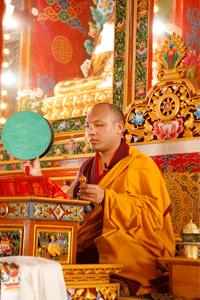26th October – Dorzong Monastery, Gopalpur.
 Today His Holiness commenced a historical three-days of Chod teachings, conferring the empowerment for the first time ever. Hosted by His Eminence the 8th Dorzong Rinpoche at his institute in the Kangra Valley near Dharamsala, the Dharma transmission drew an international audience of practitioners from several dozen countries, as well as nuns from across the Himalayans.
Today His Holiness commenced a historical three-days of Chod teachings, conferring the empowerment for the first time ever. Hosted by His Eminence the 8th Dorzong Rinpoche at his institute in the Kangra Valley near Dharamsala, the Dharma transmission drew an international audience of practitioners from several dozen countries, as well as nuns from across the Himalayans.
“I have been enthusiastic about the Chod practice from a young age, but have had few opportunities to do formal sadhana practice, and this is the very first time I am giving the empowerment, and am very pleased to have the opportunity to do so today.”
The empowerment that His Holiness conferred in the morning was based on the Opening the Door to Space text by the 3rd Gyalwang Karmapa, Rangjung Dorje. Following the main portion of the visualization-based initiation, His Holiness offered a torma empowerment to the event’s hosts His Eminence the 8th Dorzong Rinpoche and Chogyal Rinpoche, followed by Jetsunma Tenzin Palmo and Lama Tsultrim Allione, who had initially requested the Chod empowerment from His Holiness and whose Tara Mandala organization sponsored the event.
In the afternoon session, the Gyalwang Karmapa commenced teaching based on a Guiding Instruction text by the 8th Gyalwang Karmapa, Mikyo Dorje, which outlines (among other things) a weeklong Chod retreat. As an entry point into understanding the practice of Chod, His Holiness discussed Chod—a Tibetan verb that means to cut or sever—in terms of what is to be cut and what does the cutting. Otherwise, there is the danger that we leave Chod practice at the level of mere ritual. What we aim to cut with Chod practice, he explained, are the four Maras and in particular the Mara of self-grasping or fixation. What we cut this with is the prajna or wisdom that realizes essencelessness, or lack of self.
After the initial introduction, His Holiness turned to the topic of renunciation, or “definite emergence”—the clear understanding that all samsara, or cyclic existence, is suffering in nature, and the wish to definitely emerge from that. The Gyalwang Karmapa cautioned against assuming samsara is something external and separate from us. Samsara includes not only the world around us, but also exists within us and is produced by our own troubled emotional state. Addressing the largely Western audience, His Holiness noted that there is a tendency to confuse subtle forms of suffering with pleasure. As a result, we end up exerting ourselves greatly, chasing more suffering. Quoting the 8th Gyalwang Karmapa, His Holiness stated that all authentic independence is happiness, while all lack of freedom is suffering. He went on to explain that this authentic independence is something to be cultivated and an attitude that can be developed, focusing on freedom from karmic cause and effect and emotional disturbances.
Although outer conditions have a minor part to play, they cannot secure our happiness. For that, he said, we must look within.


